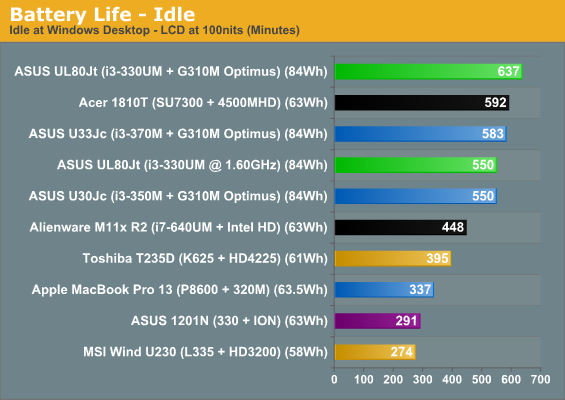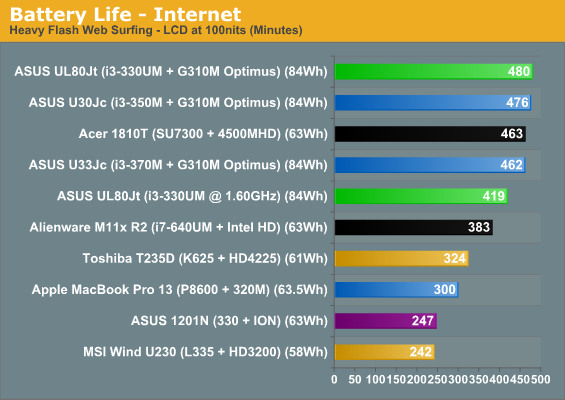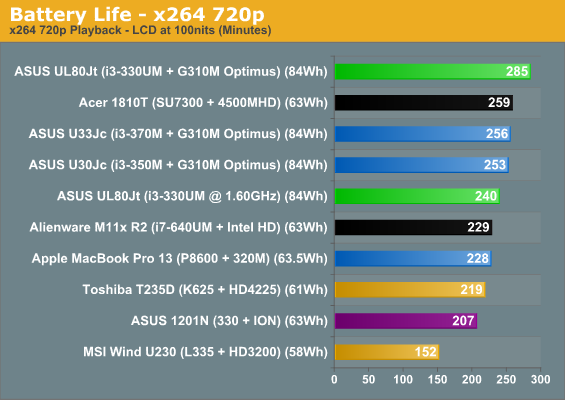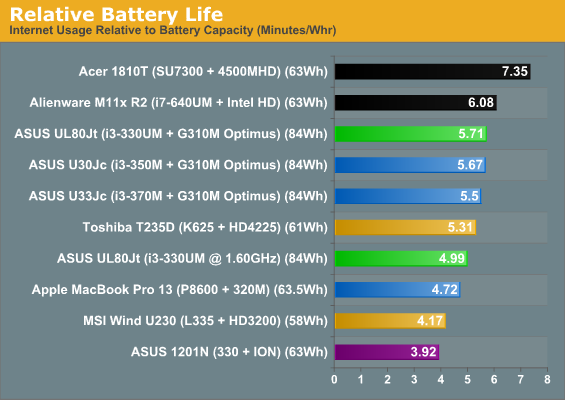ASUS UL80Jt: Overclocked i3 ULV
by Vivek Gowri on November 17, 2010 1:15 PM ESTASUS UL80Jt—Battery Life
The UL80Jt has a mediocre CPU and a mediocre GPU, but the real question is, can it match its predecessor’s amazing battery life? Sadly, no.




It’s not too much better than the U3x models that we had in the labs previously. Not to complain about 10.5 hours of ideal case battery life, but that’s significantly worse than the previous generation UL80Vt and only about 45 minutes more than the U30/3/5Jc trio. Given the cut in processing performance, I’m seriously disappointed.
I’ve been hearing some things spoken in hushed tones, mostly alleging that the Core 2010 ULV processors aren’t nearly as power efficient as the previous generation CULV processors, and our experience with the i3 and i7 ULV chips is proving this correct. If there’s only 45 minutes to be gained by switching to the ULV processors, it’s far more worthwhile to go for the regular i3-based system, especially if we’re talking about the difference between 9.75 and 10.5 hours of battery.
This isn’t to complain about having 10.5 hours of battery life, which is awesome in its own right, but it’s just not as impressive when viewed in context of the UL80Vt and the U30Jc. Things get not happy when we turn on the overclocking though, as we end up seeing less battery life than the U3x series.










47 Comments
View All Comments
slagar - Wednesday, November 17, 2010 - link
"Unfortunately, the LCD bezel is still glossy plastic, a recurring theme with ASUS notebooks. Dustin went off on this in his last review, but I’d like to touch on it again. It’s stupid, stop doing it."This gave me a laugh; well said. Nice review, thanks!
I think the CULV i3 is well suited to 11-12" notebooks, like the UL20FT, as long as you don't mind the short battery life. But as said in the review, it sort of loses its purpose in such a "large" laptop when there are better options available.
Personally, I've still got an EEEPC 900 and it goes great. I'm looking at upgrading to a 12" UL20, but I'm not completely satisfied with the current revisions; maybe next year ;)
scook9 - Wednesday, November 17, 2010 - link
I have a UL80Vt from work and aside from the horrible build quality and screen and touchpad (I know, right?) it is a great laptop. I like that the battery life is longer than windows 7 can handle (sits at 10h 00m for like 1.5 hours haha)And if you get SetFSB...Well I was able to bench my UL80Vt at 320 FSB without any instability :D - at room temperature with no special measures taken.
G-Man - Wednesday, November 17, 2010 - link
Hi, VivekI like how you intentionally come across as frustrated and resigned over both keyboard and the lcd-screen. Actually, you seemed frustrated throughout the entire review. The reviews aren't usually so harsh here on Anandtech, but in my opinion it was a nice change of pace.
VivekGowri - Wednesday, November 17, 2010 - link
It was kind of a frustrating notebook all around, actually. I mean, it was slower and had worse build quality than the U30, but everything else (including price and battery life) was basically the same. So while it's not a bad notebook, I don't really understand why it exists, or why anyone would buy it versus the U30.AstroGuardian - Wednesday, November 17, 2010 - link
Why? Because not everybody buys a laptop for some special reason. And most people want to just buy a laptop. Not everybody looks for a hair inside the egg you know.VivekGowri - Wednesday, November 17, 2010 - link
Let's say Honda made an Accord with the 1.5L Fit engine that has roughly 60% of the power as the Accord's standard 2.4L 4-cylinder. Let's say this model with the undersized engine got very marginally better fuel economy and cost the same as the larger engine, but was significantly slower than the normal 2.4L Accord.You would question what the point was. Not every notebook needs to be "special", but come on - Asus sells a very parallel system that costs the same, weighs the same, gets roughly the same battery life, has better build quality, and is significantly faster.
Evil_Sheep - Thursday, November 18, 2010 - link
Asus's product strategy seems to be: unload a dozen clips in the general direction of the target, hope something hits. To continue that analogy, Apple would be the professional hitman who waits hours for the perfect shot and then only fires once. The contrast could not be more extreme.To be fair, Apple's execution isn't flawless and Asus's is hardly terrible. It just would be nice if it weren't so scattershot.
fokka - Thursday, November 18, 2010 - link
"Asus's product strategy seems to be: unload a dozen clips in the general direction of the target, hope something hits." roflmao :Djabber - Thursday, November 18, 2010 - link
Remember we are judging this machine (most of us) purely as a written comparison with another machine thats just a few months old.Most of the folks who look at this machine and buy this machine will love it and think its brilliant.
Why? Cos their last PC or laptop was bought 5 years ago.
On its own it still sounds a pretty decent machine...but we nit pick essentially over cup holders.
strikeback03 - Thursday, November 18, 2010 - link
I'm pretty sure most people buying a laptop on the internet do at least a little research (look at the "What laptop should I buy" thread over at notebookreview) and even a little searching will show that the current UL series seems inferior to the U3x series. So if internet buyers are out, that leaves in-store buyers, and unless the U3x isn't present while the UL is, the better build quality of the U3x will probably be the deciding factor. So sure this is an upgrade to something 5 years old, but when better upgrades are easily available it still doesn't make sense.